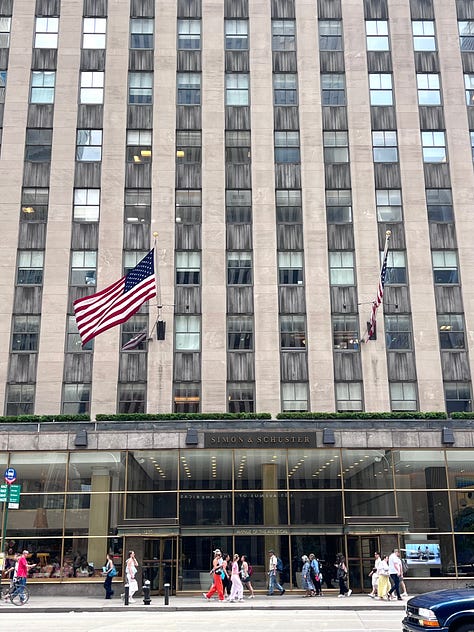“So,” he says. “You’re a writer.”
I give him a half smile and hold out my name tag. “Yes,” I admit as I reach over to press the button for floor 28. “Guilty as charged.”
“Have you published any books?”
“My twelfth comes out in November,” I say, fumbling in my bag so I can prove it. This is what elevator rides at book conferences are for, right? I’m notoriously bad at self promotion, but I did remember to make bookmarks for ThrillerFest, a feat I’m quite proud of. Holding out the slip of cardstock I ask: “How about you? Are you a writer, too?”
He pauses for just a moment, ignoring my bookmark, and in the span of a heartbeat or two I have the opportunity to really look at him. He’s in his eighties, I’d guess, hunched over a cane but wearing a very nice pair of pressed pants and a linen shirt with intricate embroidery that looks expensive. His fingers are thick with gold rings and there’s a wide chain around one liver-spotted wrist. I’m at least six inches taller than him, and I incline my head, give him an encouraging smile as I wait for his answer.
“Oh, no,” he grins up at me in what can only be described as a wolfish expression. I feel myself tilt away a bit as he continues:
“I’m in AI. We’re going to put you out of business.”
I freeze, my hand in midair and my heart stuttering. Did he just say what I think he said? Before I can seek clarification, the bell dings for his floor and he gives me a little salute.
“Look on the bright side,” he says as he shuffles off the elevator. “Soon you’ll be able to ‘write’ fifteen books in the time it once took you to write just one.” His fingers gnarl air quotes around the word write, and then the elevator doors slide closed and he’s gone.



I just spent an exciting/fun/inspiring/exhausting four days in New York City at the infamous ThrillerFest Conference, a veritable smorgasbord of the best and brightest in crime, mystery, suspense, and, of course, thrillers. I rubbed shoulders with literary icons like John Grisham, James Patterson, and Jennifer Hillier. R.L. Stine was there, as well as many of my favorites: Lisa Unger, Wendy Walker, Will Dean, Danielle Girard, Tosca Lee, Hank Philippi Ryan, and so many many more. I made tons of new friends, and I walked around like a kid in a candy store, wide-eyed and just a little bit terrified. What to say?!? How to act?!? I’m so nervous! Ohmygoshwehugged!
So to have an experience like the one I had in the elevator was a bucket of ice water in the midst of what had, up until that point, been an all-out, warm-and-fuzzy love-fest of books and writing and words and writers. Mr. AI was long gone, but I stood there trembling.
AI is a fraught topic in publishing for obvious reasons, but it feels especially loaded for authors. We are the ones whose intellectual property was stolen and used to train AI.
We are the ones who spend hours and weeks and literal years slaving over manuscripts, struggling with writer’s block, and then agonizing over whether or not anyone will buy our labor of love, never mind like it. And we haven’t even touched on the all-too-new expectation for authors to be marketing our own work, playing the part of perpetual cheerleader and publicist in the hope that enough books will sell and another contract will be assured.
The publishing industry for authors can be ridiculously painful and humbling—before strangers are allowed to eviscerate our work, we must first have agents, editors, and sales teams weigh the value of each manuscript and decide if the ROI is worth it. Can they sell this book? Is there space in the market? Is the timing right? Do they believe in it? And once a contract is secured, there are no guarantees. Marketing budgets dry up. Books that should have been blockbuster bestsellers flop. I’ve even had friends who’ve had contracts pulled mid-stream. All that time, all those words, just relegated to a forgotten drawer.
But none of this enormous risk begins to account for the emotional significance of sharing your art with the world. This incredibly personal, intimate act of opening a vein and offering a bit of your lifeblood is at once beautiful and dangerous, a potentially devastating self-sacrifice that may or may not be received and understood.
The thought of outsourcing any of that creative process to a machine is nothing short of horrifying.
I think a lot of people romanticize the life of a writer. Maybe they envision a velvet smoking jacket and a snifter of brandy, a stack of antique books and a faithful dog at our feet. Let me assure you: it’s nothing like that. It’s hard work and hustle. Buckets of NOs for every YES. It’s grit and sweat and often tears, and it is deeply, deeply personal. I don’t know a single author who doesn’t put their entire heart and soul into every book they write from slim cozy mystery to Pulitzer Prize-winning doorstop tome.
Just a few hours before my encounter in the elevator, at one of the panels, the topic of AI had been brought up. It felt like the whole room held its breath, waiting for the panelists to speak…
Because among authors AI is a scary unknown. There are a few writers I have encountered who advocate for measured AI use. Using it to help create lists perhaps, or organize plots points or writing ideas. And, maybe that’s okay??? But I’ll be honest with you: AI makes me recoil. I want nothing to do with it and have never, not once used it in any way in my writing-related pursuits (novels, poetry, flash fiction, Substacks, or even as an assistant for writing social media copy). And I was heartened when one of the authors on the panel bravely spoke up. I don’t remember everything she said (or even who did the speaking!), but at the end of a thoughtful monologue, she ended with (and I’m paraphrasing):
“No matter how advanced AI becomes, it will never have a soul. It can never, ever do what we do.”
The entire room burst into applause. I could have cried. Amen and amen.
You may not be a writer, but I think the message holds true for us all: We are not replaceable. Not by AI, not by a machine, and not by another person. In a world that is becoming increasingly disconnected, distracted, and digital, we matter. Our face-to-face human contact, our quirky ideas and interesting laughs and even the scent of our skin is as essential and necessary as the air that we breathe.
At the C gates in O’Hare tonight, I waited for a delayed flight. And some kid with scruffy hair—all awkward limbs and adolescent inelegance—sat down at a grand piano tucked into a corner. He began to play. The moment I realized that the music was live, that a human was creating as we sat in the cold terminal, I stopped what I was doing. I looked up. I found him in his mint-colored t-shirt and athletic shorts, a windbreaker tied around his waist. His mother stood nearby, watching, a bit nervous, I think, but when the song was over we all broke into applause. C gates 16-18 plus the little French bar and the people at the Hudson News, were all clapping for some kid we didn’t know and the beauty that he was drawing out of nothingness.
No piped-in song could ever accomplish that. No elevator-music soundtrack could make us all stop and admire the humanity—the sheer capacity for life and light and wonder—in this stranger, a kid that none of us knew, but all of us, for just a moment, loved.
Beautiful boy, keep playing: we need your music. Sweet writers, keep writing: no computer could ever come close to duplicating what you do. Precious YOU, don’t stop: ever. The world needs you and all your expansive humanity. I’m so glad you’re here.
Thanks for reading. xoxo - Nicole







A delicious piece of writing that is somehow both entertaining and disturbing.
What an ass. Your community will always buy your books.